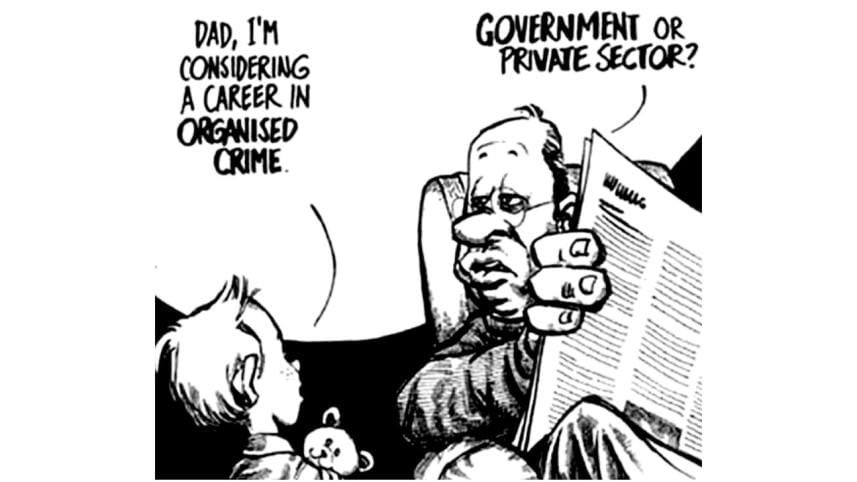Children of Privilege

It happens everywhere in the world. Our sons and daughters feel entitled to what we have earned in our lifetime. They carry our guns, ride our cars, use our bodyguards, eat our food and at the end of the day feel restless when the traffic gets tough. After all, it's not easy to cope with Dhaka traffic or the waterlogging, let alone the ugly billboards and the waste dump stations that occupy most of our streets. After all, there's no quick solution in sight as any solution takes months to be addressed and at times even a few years. In a dismal situation like this, how can we expect our children to feel anything but anger? And if they are shooting innocent people on the streets for sharing their roads, it's of course understandable. After all, these are our innocent children who need to be shielded by us. So we save them, let them ride our official duty free Prado jeeps, equip them with gun licenses and let them shoot when in disgust. In the process if a few people have lost their lives, who cares? After all, those who died don't count. They are not the children of the privileged; they are children of a far lesser god.
Children of powerful gods are everywhere, of course. For instance, Sebastián Dávalos, the son of Chilean President Michelle Bachelet, has cost his mother her reputation while he handles the corruption scandal involving his wife Natalia Compagnon and her company Caval. Bachelet's son and daughter-in-law are being investigated after Caval purchased land in the south of Chile, Machalí, with a $10m (£6.7m) loan Dávalos secured from Banco de Chile. The loan was initially denied but reports allege Dávalos met with Chilean entrepreneur Andrónico Luksic to negotiate a deal. Caval later sold the land at a higher price following development plan changes, netting the company about $5m in profit. Apparently, the President 'did not know' about his son's loan and land purchase. The corruption scandal has rocked La Moneda and Bachelet's return to the Chilean presidency.
The problem, however, remains that powerful people must know where their children are investing, how they are acquiring wealth, when they are on "drugs" or killing rickshaw pullers and CNG drivers when they get distressed in traffic. This lack of information is actually symptomatic of a system that is beholden to the political class. This relationship, in turn, stems from the perception of 'mai-baap' sarkar where those having political power are put on a pedestal and viewed as rulers and patronage-givers rather than public servants. As a result, those associated with politicians – including family members – bask in reflected status and power.
Dynastic politics has also become a widely practiced process in our part o f the world. So, with the replacement of the Gandhis and the Congress Party by Narendra Modi and the Bharatiya Janata Party (BJP), India's TV channels have quickly proclaimed the end of dynastic rule. However an article in The Hindu subsequently noted that 24 percent of the current Parliament (130 MPs) has a dynastic background. India, however, is not the most extreme case of dynasticism in a modern democracy for which comparable data are available. That distinction belongs to the Philippines, in which half of all Congress persons in 2007 followed a relative into elected office. In Japan, Iceland and Ireland, between a third and a fourth of elected legislators in 2009 were dynastic. This distinguishes it from countries such as the UK, Belgium, Israel, the US, Norway, and Canada, in which the proportion of dynastic legislators ranged between 1 percent and 11 percent, respectively.
Now there's nothing wrong with sons or daughters coming into politics provided they are well-bred and prepared. In fact, it's natural for a son to be following his mother or his father into politics as the natural environment allows them to do so. What's however wrong is when we let our children go astray, demand little education from them and allow them to call the shots on our history and political property from abroad without having been properly tested . . . academically. There lies our tragedy. The realisation that bad sons don't really reflect on a particular political party and that a bad apple is always an unfortunate rotten one needs to be reckoned with.
Your columnist recalls a time when she disallowed her young sons to play with tiny water guns. Today, ironically, many grown up sons have started playing with guns while they are drunk and dissatisfied. As parents - need we remind ourselves that while the death of an auto-rickshaw driver Yakub Ali and rickshaw-puller Abdul Hakim may not have touched our lives and while their deaths are being viewed as an accident caused of one of our sons gone bad - we remain hugely responsible to convey to our children that life does not end with lineage and there is a higher God who designs the higher destiny. . .
The writer is Managing Director, Mohammadi Group.

 For all latest news, follow The Daily Star's Google News channel.
For all latest news, follow The Daily Star's Google News channel.
Comments